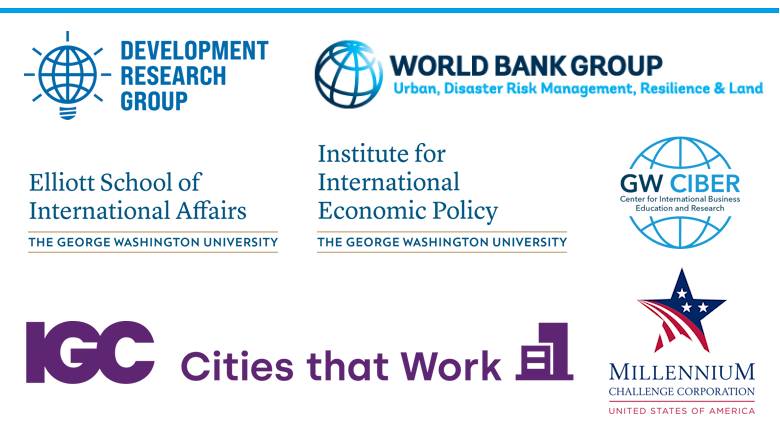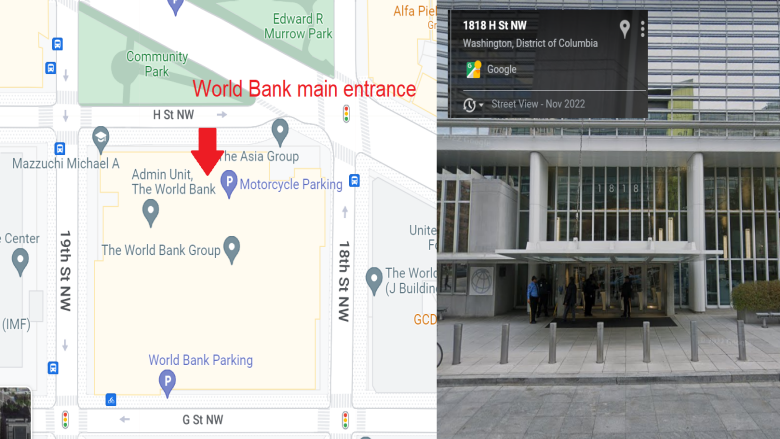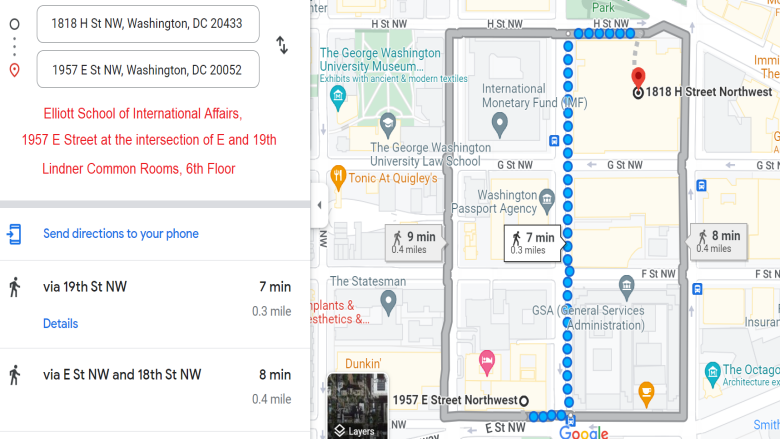
Video Replays
Recordings of the plenary sessions on March 7, 2024 are available on YouTube:
- Welcoming Remarks and Opening Session: "Urban Expansion and the Future of Cities"
- Policy Session: "Planning in African Cities"
- Keynote Address and Debate: "The Promises, Problems, and Policy Pitfalls of Urban Development"
For additional details on the sessions, see the agenda tab.
About the Conference
The 8th Urbanization and Poverty Reduction Research Conference will bring together academics and development practitioners to present and discuss questions relating to urban expansion and the future of cities.
The theme is of increasing importance to academics and policy makers alike as the supply of ideas and demand for solutions to address the challenges of urban expansion are growing. Cities in some developing countries are growing at faster rates and at lower income levels than those in developed countries. If well-directed and well-managed, expansion and densification of urban areas can bring economic growth while also offering poverty reduction opportunities. If poorly directed and managed, the result can be congested, unsustainable, and unproductive environments.
Planning for the cities of tomorrow is thus a crucial task, but one benefitting from a multi-disciplinary approach. This edition of the conference will draw from experts at the interface of policy and research to understand which new ideas, new methods, and new collaborations can bring about necessary changes.
The conference will feature a series of policy- and research-oriented events on March 7, 2024, followed by a more technical series of seminars and events (including a Young Urban Economist Workshop) on March 8, 2024. The conference is co-sponsored by the World Bank (Development Research Group and Urban, Disaster Risk, Resilience, and Land), George Washington University (Elliott School of International Affairs, Institute for International Economic Policy, and Center for International Business Education and Research), the International Growth Centre (Cities that Work and Cities Research Program), and Millennium Challenge Corporation.
- OVERVIEW
- AGENDA
- VENUE
- CALL FOR PAPERS
- RELATED
Conference Organizers
Harris Selod (The World Bank)
Remi Jedwab (George Washington University)
Victoria Delbridge (International Growth Centre)
Oliver Harman (International Growth Centre)
Tanner Regan (George Washington University)
Mesbah Motamed (Millenium Challenge Corporation)
Roman David Zarate (The World Bank)
Inquiries
Email: urbanizationconference@worldbank.org

The organizers acknowledge the generous financial support received from the World Bank Knowledge for Change Program www.worldbank.org/kcp in support of the conference.
DATE: March 7-8, 2024
LOCATION: World Bank, 1818 H Street NW, Washington DC 20433
DAY 1 (March 7) | DAY 2 (March 8)
Last updated: March 13, 2024
DAY 1 (March 7)
| 8:30 - 9:00am | Registration and Coffee (MC Front Lobby) |
| 9:00 - 9:15am | WELCOMING REMARKS (Preston Auditorium - ground floor) Indermit Gill, Senior Vice President & Chief Economist, The World Bank Deon Filmer, Director, Development Research Group, The World Bank Jonathan Leape, Executive Director, International Growth Centre |
| 9:15 - 10:35am | OPENING SESSION: Urban Expansion and the Future of Cities (Preston Auditorium - ground floor) CHAIR AND MODERATOR PANELISTS Omar Masud, Chief Executive, Urban Unit, Pakistan and Cities that Work Council Member Don Davis, Ragnar Nurkse Professor of Economics, Columbia University Maisy Wong, James T. Riady Associate Professor of Real Estate, The Wharton School, University of Pennsylvania |
| 10:35 - 10:45am | Mini Coffee Break (MC Front Lobby) |
| 10:45am - 12:15pm | POLICY SESSION: Planning in African Cities (Preston Auditorium - ground floor) CHAIR POLICY ADDRESS Charles Hinga, Principal Secretary, State Dept for Housing and Urban Development, Kenya Mohammed Alhassan Damba, Immediate Past President of Ghana Institute of Planning, Ghana RESPONDENTS Edward Glaeser, Fred and Eleanor Glimp Professor of Economics, Harvard University, and Co-Director of the Cities Research Programme, International Growth Centre |
| 12:15 - 1:30pm | Lunch Break (MC Front Lobby) |
| 1:30 - 3:00pm | KEYNOTE ADDRESS AND DEBATE (Preston Auditorium - ground floor) CHAIR KEYNOTE ADDRESS: The Promises, Problems, and Policy Pitfalls of Urban Development RESPONDENTS Elena Ianchovichina, Head of Frontier Knowledge, World Bank's Jobs Cross-cutting Solutions Group Catalina Marulanda, Practice Manager, Sub-Saharan Africa Region, The World Bank Omar Masud, Chief Executive, Urban Unit, Pakistan and Cities that Work Council Member Ming Zhang, Practice Manager, East Asia and the Pacific Region, The World Bank |
| 3:00 - 3:30pm | Coffee Break (MC Front Lobby) |
| PARALLEL THEMATIC SESSIONS Note: The following three sessions will run in parallel from 3:30 - 5:00pm |
|
3:30 - 5:00pm |
THEMATIC SESSION A: Urban Expansion (Preston Auditorium - ground floor) CHAIR ACADEMIC SPEAKERS Mathilde Lebrand, Senior Economist, Prospects Group, The World Bank POLICY SPEAKER DISCUSSANT |
3:30 - 5:00pm |
THEMATIC SESSION B: Incremental Housing (MC 4-800, 4th floor, conference room 800, in the 800s section of the building) CHAIR ACADEMIC SPEAKERS Maisy Wong, James T. Riady Associate Professor of Real Estate, The Wharton School, University of Pennsylvania POLICY SPEAKER DISCUSSANT |
3:30 - 5:00pm |
THEMATIC SESSION C: City Structures (MC 13-121, 13th floor, conference room 121, in the 100s section of the building) CHAIR ACADEMIC SPEAKERS Nick Tsivanidis, Assistant Professor, UC Berkeley, and Co-Director of the Cities Research Programme, International Growth Centre POLICY SPEAKER DISCUSSANT |
| 5:30 - 7:30pm | Cocktail Reception George Washington University, Elliot School of International Affairs, Lindner Commons Room (6th floor), 1957 E ST NW, Washington, DC (intersection of E and 19th Street, on E Street) |
DAY 2 (March 8)
| 8:30 - 9:15am | Registration and Coffee Latecomers registration at Visitor’s Center (on the side of the building) and coffee (rooms MC 2-800, MC C2-350 and MC 13-121) |
| PARALLEL RESEARCH SESSIONS 1 Note: The following three sessions will run in parallel from 9:15 - 11:15am |
|
9:15 - 11:15am |
RESEARCH SESSION 1A: Local Economic Development (MC 2-800, 2nd floor, conference room 800, in the 800s section of the building) CHAIR PAPERS Paper 1A.2: Tillman Von Carnap (Center for Food Security and the Environment), “Rural Marketplaces and Local Development” Paper 1A.3: Jevgenijs Steinbuks (The World Bank), “Infrastructure Complementarities and Local Economic Growth: Evidence from Electrification and Highway Construction in Brazil” Paper 1A.4: Qingua Zhang (Guanghua School of Management), “Build up a Metropolis: Land Use Regulations. Spatial Misallocation, and Welfare DISCUSSANT |
9:15 - 11:15am |
RESEARCH SESSION 1B: Segregation (MC C2-350, basement level C2, conference room 350, in the 300s section of the building) CHAIR PAPERS Paper 1B.2: Magdalena Rossetti (London School of Economics), “Identifying the Spatial Patterns of Multidimensional Poverty: The Case of Chile” Paper 1B.3: Shohei Nakamura (The World Bank), "Where is Poverty Concentrated? New Evidence based on Internationally Consistent Urban and Poverty Measurements" Paper 1B.4: Tekalign Gutu Sakketa (German Institute of Development and Sustainability), “Urbanization and Social Cohesion: Theory and Empirical Evidence from Africa” DISCUSSANT |
9:15 - 11:15am |
RESEARCH SESSION 1C: Transportation (MC 13-121, 13th floor, conference room 121, in the 100s section of the building) CHAIR PAPERS Paper 1C.1: Alice Duhaut (The World Bank), “Public and Private Transit: Evidence from Lagos” Paper 1C.2: Lucas Conwell (University College London), “Subways or Minibuses? Privatized Provision of Public Transit” Paper 1C.3: Lea Bou Sleiman (NBER), “Displacing Congestion: Evidence from Paris” Paper 1C.4: Shanjun Li (Cornell), “The Welfare Effects of Passenger Transportation Infrastructure: Evidence from China's High Speed Rail Network” DISCUSSANT |
| 11:15 - 11:30am | Break |
| WORKSHOPS AND POLICY SESSIONS Note: The following two workshops will run in parallel from 11:30am - 12:30pm |
|
11:30am - 12:30pm |
YOUNG URBAN ECONOMIST WORKSHOP - PART 1 (MC 2-800, 2nd floor, conference room 800, in the 800s section of the building) INTRODUCTORY REMARKS CHAIR PAPERS Paper YUE 2: Stefan Leeffers (University College London), “It Will Rain: The Effect of Information on Flood Preparedness in Urban Mozambique” |
| 11:30am - 12:30pm | USING QUANTITATIVE SPATIAL MODELS FOR POLICY WORKSHOP (MC 3-570, 3rd floor, conference room 570, in the 500s section of the building) CHAIR SPEAKERS Nick Tsivanidis, Assistant Professor in Real Estate, UC Berkeley, and Co-Director of the Cities Research Programme, International Growth Centre Roman Zarate, Economist, The World Bank RESPONDENT |
| 12:30 - 1:15pm | Lunch Break (Rooms MC 2-800 and MC C2-350) |
| Note: The following workshop and policy session will run in parallel from 1:15 - 2:45pm | |
| 1:15 - 2:45pm | YOUNG URBAN ECONOMIST WORKSHOP - PART 2 (MC 2-800, 2nd floor, conference room 800, in the 800s section of the building) CHAIR PAPERS Paper YUE 4: Olivia Bordeu (Chicago Booth), “Commuting Infrastructure in Fragmented Cities” KEYNOTE ADDRESS: "Cities, Infrastructure, and Government Capacity" |
| 1:15 - 2:45pm | POLICY SESSION: Connecting Policy, Projects, and Research (MC 13-121, 13th floor, conference room 121, in the 100s section of the building) CHAIR Jonathan Leape, Executive Director of the International Growth Centre RESPONDENTS Hugh Cole, Director of Strategy, City of Cape Town, South Africa Mohammed Alhassan Damba, Immediate Past President of Ghana Institute of Planning, Ghana Charles Hinga, Principal Secretary, State Dept for Housing and Urban Development, Kenya James Maina, State Department of Housing and Urban Development, Kenya Omar Masud, Chief Executive, Urban Unit, Pakistan and Cities that Work Council Member |
| 2:45 - 3:00pm | Coffee Break (Rooms MC 2-800, MC C2-350 and MC 13-121) |
| PARALLEL RESEARCH SESSIONS 2 Note: The following three sessions will run in parallel from 3:00 - 5:00pm |
|
3:00 - 5:00pm |
RESEARCH SESSION 2A: Crime and Conflict in Cities (MC 2-800, 2nd floor, conference room 800, in the 800s section of the building) CHAIR PAPERS Paper 2A.2: Daniel Ramos Menchelli (Johns Hopkins SAIS), “Spatial Mobility, Economic Opportunity, and Crime” Paper 2A.3: Joaquin Urrego (UC Berkeley), “The Evolution of Slums in Chile, 2000-2021” Paper 2A.4: Andre Gray (UC San Diego), “Diversity, Conflict, and Agglomeration in African Cities” DISCUSSANT |
3:00 - 5:00pm |
RESEARCH SESSION 2B: Housing (MC C2-350, basement level C2, conference room 350, in the 300s section of the building) CHAIR PAPERS Paper 2B.2: Qiayo Zhou (University of Maryland), “Haste or Waste? The Role of Presale in Residential Housing” Paper 2B.3: Vaidehi Tandel (University of Manchester), “Do Mandatory Disclosures Squeeze the Lemons? The Case of Housing Markets” Paper 2B.4: Kala Sridhar (Institute for Social and Economic Change), "Urban Form in India 1975-2015: Have India’s cities become flat?” DISCUSSANT |
3:00 - 5:00pm |
RESEARCH SESSION 2C: Urban Labor Markets (MC 13-121, 13th floor, conference room 121, in the 100s section of the building) CHAIR PAPERS Paper 2C.2: Luc Christiansen (World Bank), “Do More Urban Migrants Lead to Better Urban Wages and Welfare? Insights from Uganda” Paper 2C.3: Yao Wang (Ohio State University), “Evaluating the Relocation of Indonesia’s Capital: A Quantitative Spatial Model Approach” Paper 2C.4: Victoria Xie (Leavey School of Business, Santa Clara), “Do Resource Rents Drive Urbanization and Structural Transformation? A Global Analysis” DISCUSSANT |
About the Venue
The conference will be held at the World Bank's Headquarters, located at 1818 H Street, NW, Washington DC 20433, USA.
World Bank Main Entrance
Please do not use the visitor’s entrance on 18th street but the main entrance at 1818 H street near the intersection of H street and Pennsylvania Avenue.

Elliott School of International Affairs
The cocktail reception will take place on the first day of the conference (March 7) from 5:30 pm to 7:30 pm at the Elliott School of International Affairs, 1957 E Street at the intersection of E and 19th Streets (Lindner Common Rooms, 6th Floor) - GWU (George Washington University). The image below will show you how to get from the World Bank MC building to 1957 E Street.

Note that the call for papers associated with this conference is being coordinated by IGC. Please visit their website for the latest updates on the paper selection process.
This year the conference organizers are conducting an international call for papers to promote engagement with a diverse range of scholars across the world. We will explore how cities' development has consequences on productivity, liveability, sustainability, and inequality.
- We are interested in building bridges between economic research and other social science fields such as urban planning, environmental sciences, and economic geography. Thus, we are accepting papers from various methodological standpoints, but primarily with a quantitative or mixed methods framework.
- A non-exhaustive list includes land use simulation models, spatial economic models, RCTs, spatial econometrics, GIS mapping and analysis, gravity models, location theory, remote sensing, satellite data acquisition and analysis, longitudinal studies, spatial statistical analysis and Big Data analytics.
- Focus on developing countries is highly desired, but not essential.
As part of the call for papers, certain young scholars will be chosen to partake in the Young Urban Economist Workshop and will receive feedback on their papers from Professor Ed Glaeser. These scholars and select developing country scholars will be eligible to receive funding for travel and accommodation. Application will happen automatically, so please submit as normal.
There are no associated conference fees and food will be provided.
Paper submission and queries: The call for papers closed on 27 November 2023. Please direct any queries regarding this call to
oliver.harman@bsg.ox.ac.uk.
World Bank Development Research Group
Elliott School of International Affairs at George Washington University
Institute for International Economic Policy at George Washington University
International Growth Centre - Cities that Work Initiative
7th Urbanization and Poverty Reduction Research Conference, 30 January 2023
6th Urbanization and Poverty Reduction Research Conference, 9 September 2019
5th Urbanization and Poverty Reduction Research Conference, 7 September 2018
4th Urbanization and Poverty Reduction Research Conference, 8 September 2017
3rd Urbanization and Poverty Reduction Research Conference, 1 February 2016
2nd Urbanization and Poverty Reduction Research Conference, 12 November 2014
1st Urbanization and Poverty Reduction Research Conference, 13 May 2013
